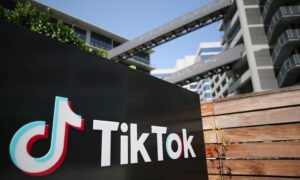Ban TikTok Everywhere
CommentaryIt’s time to ban TikTok. The social media app is wildly popular with young adults and children but controlled by an authoritarian regime in China. Apple rates the platform for users ages 12-plus. Yet the Chinese Communist Party (CCP) uses the app’s secret algorithm to influence and track their opinions, messaging, keystrokes, and locations. One billion users globally are vulnerable to the theft of their passwords and future blackmail. Based on data already collected, TikTok could leverage American leaders over the entire 21st century. TikTok is expanding into online purchases, music, search engines, warehouses, and fulfillment centers. It would like to become an everything app that replaces Google, Apple, Twitter, Amazon, and Facebook. Unfortunately, the Biden administration is doing next to nothing against the threat that TikTok poses to the American public and economy. The silence of most Democrats on the issue is a form of complicity. Republican States Against TikTok But Republicans in Congress and state capitals across the United States are increasingly voicing their concerns and stepping up to the plate. Nebraska’s Governor Pete Ricketts was the trendsetter, having banned TikTok on state-owned and leased devices two years ago. In the past few weeks, other Republican leaders—including in Texas, South Dakota, South Carolina, Maryland, and Arkansas—have taken similar actions. The State of Indiana filed two lawsuits against Tiktok, alleging the app deceives consumers about content and security. Indiana claims the algorithm purposefully addicts young people. One lawsuit claims it promotes inappropriate content and is linked to mental and eating disorders. A young girl looks at social media apps, including TikTok, Instagram, Snapchat, and WhatsApp, on a smartphone on Nov. 12, 2019. (Peter Byrne/PA) Indiana’s Republican Attorney General Todd Rokita said, “TikTok is actively exposing our children to drug use, alcohol abuse, profanity and sexually explicit material at a young age.” In South Carolina, the Republican governor not only removed the app from government devices, but asked state offices to block TikTok’s website. Republican Governor of Maryland Larry Hogan issued an emergency cybersecurity directive prohibiting technologies from both Russia and China, including TikTok, from the executive branch. South Dakota’s tourism bureau deleted its TikTok account of 60,000 followers. These states are stepping up to pay the price for U.S. national security. South Dakota’s Governor Kristi Noem, who signed the state’s executive order against TikTok, wrote that the CCP collects personal information on users, including internet browsing data and keystrokes. That would mean it could harvest passwords. In an opinion article, Noem criticized the Biden administration for insufficiently protecting the United States from foreign adversaries. “Mr. Biden hasn’t demanded that Beijing or TikTok cease gathering the data of American citizens, and he hasn’t pushed Congress to ban the app nationally,” she wrote. “By refusing to respond to this threat, the president is allowing China’s communist leaders to continue their attack on American security.” Noem also plans to work with South Dakota’s legislature to address China’s buying of American farmland. Companies from China often purchase land near U.S. military bases, threatening surveillance of strategic assets, including nuclear weapons. “South Dakota is showing the nation how to create a state-led response to threats from communist China,” the governor wrote. “We are taking the lead on preventing Beijing from accessing the private data of our citizens and throttling our food supply.” Noem, a Republican, will get support from most of South Dakota’s voters as 53 percent are Republicans, compared to only 37 percent Democrats. China can be a bipartisan issue—perhaps many Democrats will support her measures. But TikTok users and farmland owners could turn against her. Taking a strong position against the CCP, even on a bipartisan issue in the United States, carries political risk. Biden’s Big Choice The Biden administration faces increasing risk from its limited options on the TikTok issue as well. Whether it bans the app or not, someone will be unhappy. But in the long run, President Joe Biden will best be served by what best serves the American people. That is a complete ban on TikTok. He should use his influence with our allies and partners internationally to do the same. India already has a national ban on the app, so he has a precedent to promote a unified global approach. Sometimes a leader needs to lead public opinion, not just follow. In any case, that global public opinion is increasingly concerned about communist China’s political influence, which could be used to alter global public opinion itself. Therefore, banning TikTok is a matter of now or never. Biden must get the point from states around the nation and step up to the plate. Views

Commentary
It’s time to ban TikTok. The social media app is wildly popular with young adults and children but controlled by an authoritarian regime in China. Apple rates the platform for users ages 12-plus. Yet the Chinese Communist Party (CCP) uses the app’s secret algorithm to influence and track their opinions, messaging, keystrokes, and locations.
One billion users globally are vulnerable to the theft of their passwords and future blackmail. Based on data already collected, TikTok could leverage American leaders over the entire 21st century.
TikTok is expanding into online purchases, music, search engines, warehouses, and fulfillment centers. It would like to become an everything app that replaces Google, Apple, Twitter, Amazon, and Facebook.
Unfortunately, the Biden administration is doing next to nothing against the threat that TikTok poses to the American public and economy. The silence of most Democrats on the issue is a form of complicity.
Republican States Against TikTok
But Republicans in Congress and state capitals across the United States are increasingly voicing their concerns and stepping up to the plate.
Nebraska’s Governor Pete Ricketts was the trendsetter, having banned TikTok on state-owned and leased devices two years ago. In the past few weeks, other Republican leaders—including in Texas, South Dakota, South Carolina, Maryland, and Arkansas—have taken similar actions.
The State of Indiana filed two lawsuits against Tiktok, alleging the app deceives consumers about content and security. Indiana claims the algorithm purposefully addicts young people. One lawsuit claims it promotes inappropriate content and is linked to mental and eating disorders.

Indiana’s Republican Attorney General Todd Rokita said, “TikTok is actively exposing our children to drug use, alcohol abuse, profanity and sexually explicit material at a young age.”
In South Carolina, the Republican governor not only removed the app from government devices, but asked state offices to block TikTok’s website.
Republican Governor of Maryland Larry Hogan issued an emergency cybersecurity directive prohibiting technologies from both Russia and China, including TikTok, from the executive branch.
South Dakota’s tourism bureau deleted its TikTok account of 60,000 followers.
These states are stepping up to pay the price for U.S. national security.
South Dakota’s Governor Kristi Noem, who signed the state’s executive order against TikTok, wrote that the CCP collects personal information on users, including internet browsing data and keystrokes. That would mean it could harvest passwords.
In an opinion article, Noem criticized the Biden administration for insufficiently protecting the United States from foreign adversaries.
“Mr. Biden hasn’t demanded that Beijing or TikTok cease gathering the data of American citizens, and he hasn’t pushed Congress to ban the app nationally,” she wrote. “By refusing to respond to this threat, the president is allowing China’s communist leaders to continue their attack on American security.”
Noem also plans to work with South Dakota’s legislature to address China’s buying of American farmland. Companies from China often purchase land near U.S. military bases, threatening surveillance of strategic assets, including nuclear weapons.
“South Dakota is showing the nation how to create a state-led response to threats from communist China,” the governor wrote. “We are taking the lead on preventing Beijing from accessing the private data of our citizens and throttling our food supply.”
Noem, a Republican, will get support from most of South Dakota’s voters as 53 percent are Republicans, compared to only 37 percent Democrats. China can be a bipartisan issue—perhaps many Democrats will support her measures. But TikTok users and farmland owners could turn against her.
Taking a strong position against the CCP, even on a bipartisan issue in the United States, carries political risk.
Biden’s Big Choice
The Biden administration faces increasing risk from its limited options on the TikTok issue as well. Whether it bans the app or not, someone will be unhappy.
But in the long run, President Joe Biden will best be served by what best serves the American people. That is a complete ban on TikTok. He should use his influence with our allies and partners internationally to do the same. India already has a national ban on the app, so he has a precedent to promote a unified global approach.
Sometimes a leader needs to lead public opinion, not just follow. In any case, that global public opinion is increasingly concerned about communist China’s political influence, which could be used to alter global public opinion itself.
Therefore, banning TikTok is a matter of now or never. Biden must get the point from states around the nation and step up to the plate.
Views expressed in this article are the opinions of the author and do not necessarily reflect the views of The Epoch Times.












